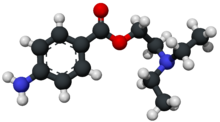Clinical Uses and Effects of Procaine
- Procaine is primarily used as a local anesthetic.
- It is commonly used in dental procedures to numb the area around a tooth.
- It is also used to reduce the pain of intramuscular injection of penicillin.
- Procaine acts as a sodium channel blocker.
- It is used therapeutically in some countries for its sympatholytic, anti-inflammatory, perfusion-enhancing, and mood-enhancing effects.
- Procaine has analgesic properties and is commonly used as a local anesthetic.
- It can also be used as an antiarrhythmic medication.
- Procaine has been found to have anti-inflammatory effects.
- It can help reduce pain and inflammation in conditions like arthritis.
- Procaine has been studied for its potential neuroprotective effects.
Pharmacology and Pharmacokinetics of Procaine
- Procaine is a vasodilator and is often coadministered with epinephrine to induce vasoconstriction.
- Vasoconstriction helps reduce bleeding, prolong anesthesia, and reduce the amount of anesthetic required.
- Unlike cocaine, procaine does not have euphoric and addictive qualities.
- Procaine is metabolised in the plasma by the enzyme pseudocholinesterase into para-amino benzoic acid (PABA).
- A 1% procaine injection is recommended for the treatment of extravasation complications and inadvertent intra-arterial injections.
- Procaine is rapidly metabolised in the body.
- It is mainly metabolised by plasma esterases.
- The half-life of procaine is relatively short, typically around 10-20 minutes.
- Procaine is primarily excreted in the urine.
- Factors such as age, liver function, and dose can affect the pharmacokinetics of procaine.
Adverse Effects and Precautions of Procaine
- Procaine can cause hypersensitivity reactions, leading to restlessness, shaking, and convulsions.
- It can cause nervousness, dizziness, and respiratory failure if overdosed.
- Procaine may weaken the myocardium, potentially leading to cardiac arrest.
- Allergic reactions to procaine are usually caused by its metabolite PABA.
- About 1 in 3000 white North Americans have a deficiency of the enzyme pseudocholinesterase, leading to increased toxicity.
- Common side effects of procaine include dizziness and lightheadedness.
- Some individuals may experience allergic reactions to procaine.
- Procaine can cause local tissue irritation at the injection site.
- Rare but serious side effects include seizures and difficulty breathing.
- Prolonged or excessive use of procaine can lead to methemoglobinemia.
- Individuals with a known allergy to procaine or related medications should avoid its use.
- Procaine should be used with caution in individuals with certain medical conditions, such as heart disease or epilepsy.
- It may interact with other medications, including blood thinners and certain antibiotics.
- Procaine should not be used in excessive amounts or for prolonged periods without medical supervision.
- Pregnant and breastfeeding women should consult with their healthcare providers before using procaine.
Synthesis of Procaine
- Procaine can be synthesised by the direct reaction of 4-aminobenzoic acid ethyl ester with 2-diethylaminoethanol.
- Another method involves oxidizing 4-nitrotoluene to 4-nitrobenzoic acid, which is then reacted with thionyl chloride and esterified with 2-diethylaminoethanol to give Nitrocaine.
- The nitro group is reduced by hydrogenation over Raney nickel catalyst to obtain procaine.
Related Topics and Uses of Procaine
- Chloroprocaine and Peter DeMarco are related to procaine.
- Procaine blockade is a concept related to the use of procaine as a local anesthetic.
- References for further reading on procaine include medical articles and studies.
- Procaine is primarily used as a local anesthetic during medical procedures.
- It can be used for dental procedures, minor surgeries, and childbirth.
- Procaine is also used in combination with other medications for pain management.
- It has been investigated for its potential use in treating certain types of cancer.
- Procaine has been used in some alternative medicine practices for various purposes.
Procaine is a local anesthetic drug of the amino ester group. It is most commonly used in dental procedures to numb the area around a tooth and is also used to reduce the pain of intramuscular injection of penicillin. Owing to the ubiquity of the trade name Novocain or Novocaine, in some regions, procaine is referred to generically as novocaine. It acts mainly as a sodium channel blocker. Today, it is used therapeutically in some countries due to its sympatholytic, anti-inflammatory, perfusion-enhancing, and mood-enhancing effects.
 | |
 | |
| Clinical data | |
|---|---|
| AHFS/Drugs.com | Monograph |
| Pregnancy category |
|
| Routes of administration | Parenteral |
| ATC code | |
| Legal status | |
| Legal status |
|
| Pharmacokinetic data | |
| Bioavailability | N/A |
| Metabolism | Hydrolysis by plasma esterases |
| Elimination half-life | 40–84 seconds |
| Excretion | Renal |
| Identifiers | |
| |
| CAS Number | |
| PubChem CID | |
| IUPHAR/BPS | |
| DrugBank | |
| ChemSpider | |
| UNII | |
| KEGG | |
| ChEBI | |
| ChEMBL | |
| NIAID ChemDB | |
| CompTox Dashboard (EPA) | |
| ECHA InfoCard | 100.000.388 |
| Chemical and physical data | |
| Formula | C13H20N2O2 |
| Molar mass | 236.315 g·mol−1 |
| 3D model (JSmol) | |
| |
| |
| | |
Procaine was first synthesised in 1905, shortly after amylocaine. It was created by the chemist Alfred Einhorn who gave the chemical the trade name Novocaine, from the Latin nov- (meaning "new") and -caine, a common ending for alkaloids used as anesthetics. It was introduced into medical use by surgeon Heinrich Braun.
Prior to the discovery of amylocaine and procaine, cocaine was a commonly used local anesthetic. Einhorn wished his new discovery to be used for amputations, but for this surgeons preferred general anesthesia. Dentists, however, found it very useful.